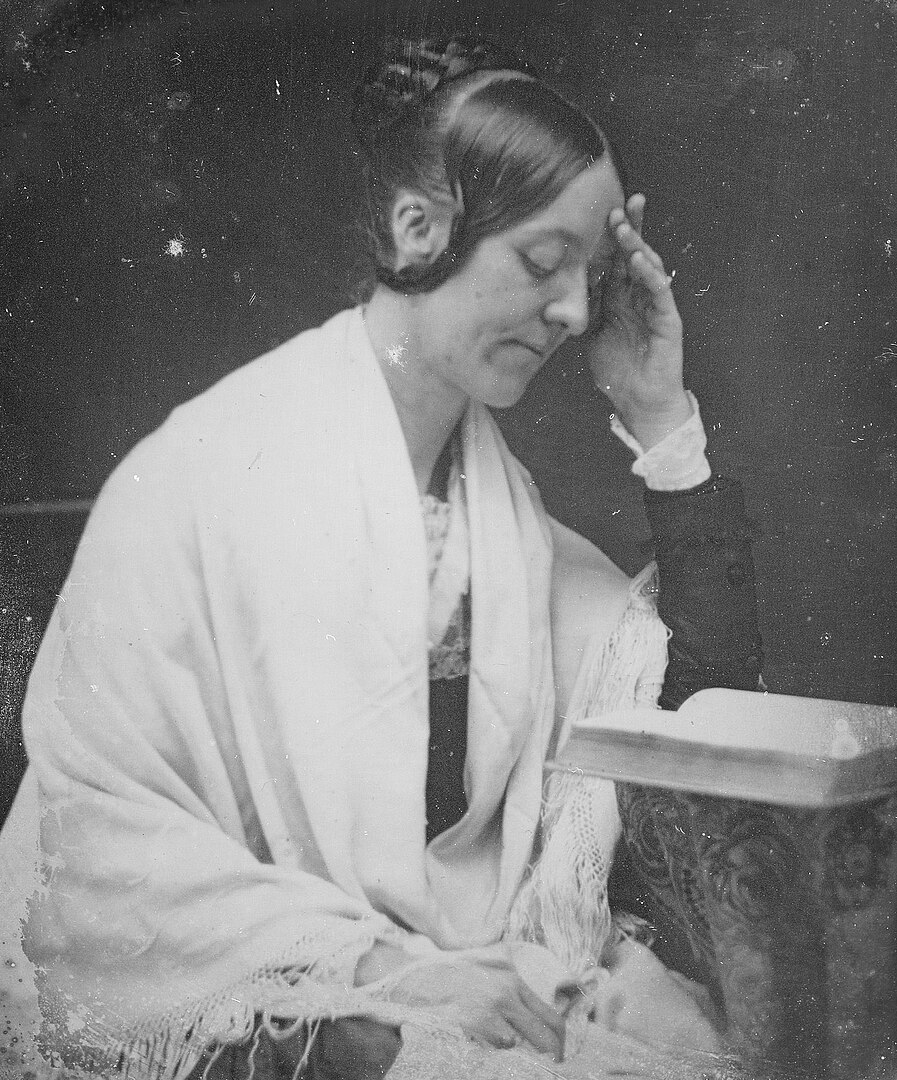
Margaret Fuller Ossoli (1810-1850)
Writer, Journalist, & Women's Rights Activist
Margaret Fuller Ossoli, author and Transcendentalist, was born in Cambridgeport, Massachusetts on May 23, 1810.
Born to Margaret, a schoolteacher, and Timothy Fuller, a Massachusetts politician, Ossoli was the first of nine children. Timothy’s disappointment with his first child’s gender resulted in a non-traditional educational path for Ossoli: she followed a masculine, Classical curriculum. This resulted in friendships with the young men who would later become major figures in the Transcendentalist movement.
When her father’s political career ended, the family moved to a farm in Groton. Her mother became ill soon after and Ossoli cared for her younger siblings. In 1835 her father died suddenly of cholera and Ossoli became the head of the household. Faced with the task of sorting her father’s finances and supporting the education of her brothers, Ossoli began looking for work. She sought work as a teacher and was hired by Bronson Alcott to teach at his Temple School. In 1839 she wrote a critical review of Washington Allston’s painting exhibition, which was published in the Transcendental journal Dial.
Ossoli moved to Jamaica Plain in 1839 and began holding Conversations, gatherings of eminent Boston women who sought education and debate of current events. In 1840 she began producing and contributing to Dial with Emerson. She resigned from her position two years later and traveled the Midwest with James Freeman Clarke; the trip was the basis of her first book, Summer on the Lakes, published in 1844. She published her second book, Woman in the Nineteenth Century, in 1845. The text combined elements of feminism and Transcendentalism and was believed to influence the Seneca Falls conference on women’s rights in 1848.
In addition to her prolific writings on women's equality Fuller also explored women's "romantic friendships" (a 19th century term for public loving relationships between members of the same sex) in her writing. In an 1838 fragment published in the Memoirs of Margaret Fuller Ossoli, she tells the story of her first love, an Englishwoman who was a friend of her family.' Fuller writes,
"One time I had been passing the afternoon with her. She had been playing to me on the harp, and I sat listening in happiness almost un-bearable. Some guests were announced. She went into another room to receive them, and I took up her book. It was Guy Mannering, then lately published, and the first of Scott's novels I had ever seen. I opened where her mark lay, and read merely with the feeling of continuing our mutual existence by passing my eyes over the same page where hers had been. It was the description of the rocks on the sea-coast where the little Harry Bertram was lost. I had never seen such places, and my mind was vividly stirred to imagine them. The scene rose before me, very unlike reality, doubtless, but majestic and wild. I was the little Harry Bertram and had lost her, —all I had to lose, -and sought her vainly in long dark caves that had no end, plashing through the water; while the crags beetled above, threatening to fall and crush the poor"
Memoirs of Margaret Fuller Ossoli, 1838
Ossoli became a foreign correspondent for the New York Tribune in 1846, and it was during her travels in Rome that she met Marquis Giovanni Angelo Ossoli, a liberal supporter of the new revolution abroad. They had a son together in 1848 and married in 1849. She wrote about the Roman Revolution and continued to write for the Tribune, but after the Revolution failed, she planned to return to the U.S. with her husband and child.
On May 17, 1850, while Ossoli sailed aboard the Elizabeth, the ship hit a sandbar in New York harbor and was lost. Neither Ossoli nor her husband’s bodies were recovered; their child’s body washed ashore. The Fuller family purchased a lot at Mount Auburn in 1854, where Ossoli’s entire family is buried together.

Margaret Fuller Ossoli’s cenotaph can be found at Lot 2250, Pyrola Path.
Footnotes:
Adapted from the research of Judy Jackson and Janet Heywood, as published in Mount Auburn’s Person of the Week: Margaret Fuller Ossoli, 1999.
